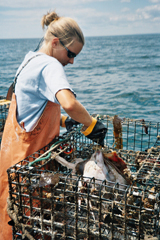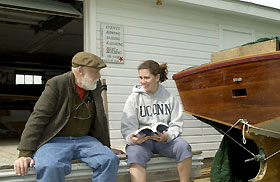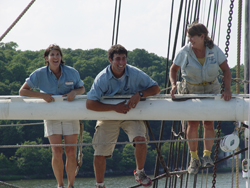Maritime Studies emphasizes experiential education. The Avery Point campus is surrounded on three sides by water and is uniquely situated between the Mystic River, with its concentration on historic vessels, especially square-rigged sailing ships, and on recreational use, and the Thames River, with its many industrial and military uses, including the ferry terminus, Electric Boat, Pfizer, the Groton Submarine Base, the Coast Guard Academy, and even a small container port. Even closer to Avery Point is the small lobster and oyster port of Noank. Internships are one of the most valuable features of Maritime Studies, and the program will help to place any interested student in an internship compatible with his or her future plans. Maritime Studies also encourages and supports visits to the resource-rich area surrounding the campus, and several Maritime Studies courses include experiential elements–taking students out on Project O boats or for a hands-on workshop at Mystic Seaport, for example.
What is an internship?
An internship provides students with an opportunity to reach outside the academic arena of the university and apply liberal arts skills and knowledge in the world. Internships can help students explore career fields, gain experience and skills, and connect classroom learning to the world of work. Because of the interdisciplinary nature of the Maritime Studies majors, internships are especially valuable for allowing students to understand direct linkages among fields that contribute to the problems and challenges of contemporary maritime issues. A carefully chosen internship experience will also enhance your resume and job portfolio for employers who want to hire individuals with both practical and classroom knowledge.
What are some examples of internships?
A fuller list of internship ideas and opportunities is listed towards the bottom of this page, but examples of regional internship sites or organizations include: Mystic Seaport, Groton Shellfish Commission, Nautilus Museum, Mystic Aquarium, the Amistad or other traditional sailing vessels, maritime businesses such as the Cross Sound Ferry, and shipping companies that are members of the Connecticut Maritime Association. Students could also network to pursue internships in local law offices, non-profits, government agencies, etc.
Can I get credit for an internship?
Yes, but it is not necessary to get credit for an internship. Sometimes students pursue internships mainly for their resume value. To get credit, students must follow College of Liberal Arts and Sciences (CLAS) guidelines for academic internships. The number of credits earned will depend on the number of hours worked. These CLAS guidelines require:
At least 42 hours of work per term for each credit earned.
An internship contract signed by the student, the on-site internship supervisor, and instructor of record outlining the work plan and final academic product, along with the number of hours of work.
A final academic product submitted for a grade.
For the full CLAS guidelines, see http://clas.uconn.edu/internships/
How will an internship fit into my Maritime Studies major?
Internships are appropriate for students who have completed at least three core MAST courses. After finding an intern site and working with a faculty member to draw up a learning contract, you register for MAST 3991, “Supervised Internship in Maritime Studies.” The course will count for between one and three credits, depending on how many hours you have committed to work. This course usually counts toward your major in the Related category, although students might also create internships through departments, such as History, Political Science or Anthropology, and count those toward your Track requirements.
When should I begin to arrange for an internship?
Because a completed learning contract is required in order to register (see list of steps to take below), you must begin this process well before the start of the semester in which you expect to do the internship.
OK, I’m interested. What steps do I need to take?
1. Read the Maritime Studies Internship handbook for ideas and think about what fields, disciplines, and potential work sites interest you. If you are interested in one of the competitive internships, you will need to go through the application process. In any case, you should make an appointment to talk to a faculty member in an appropriate field (or the Maritime Studies Coordinator).
2. Once you have identified a potential site, your faculty advisor will ask you to contact someone there who would be an appropriate on-site supervisor. You should meet with that person to discuss what work you would be doing, then draft the learning contract stating what work you would be doing and what your work schedule at the internship site will be. You should discuss with your faculty advisor what the final, graded academic product will be. For MAST internships, in addition to the final academic product, students will be required to keep either a journal or a log and to use that to produce a short (3 to 5 page) paper reflecting on how their internship experience relates to their classroom academic work within the major. See sample learning contract in the Maritime Studies Internship handbook.
3. Once your learning contract is made final and approved and signed by you, your on-site supervisor, and your faculty advisor, then you will get a permission number to register for MAST 3991.
4. Once your internship begins, you are expected to keep a log or journal of your internship activities and report regularly to your faculty advisor.
5. At the end of the internship period, submit your final academic product to your on-site supervisor, your faculty advisor, and (if it is a MAST internship) to the MAST Coordinator. Your faculty advisor will determine your grade, based on the quality of your final product, with consideration given to a report from your on-site supervisor.
Internship Ideas
UConn-Mystic Seaport Paid Summer Internship Program – 10 weeks
Spend your summer on the banks of the beautiful Mystic River as you learn about museums and maritime history. We are seeking two upper-level undergraduates who are passionate about history and curious about museum work. See how the academic history you’ve studied in school is translated into public history at the nation’s fourth largest history museum. One to two days each week will be spent working closely with museum staff on a specific project or research topic. You’ll get a behind-the-scenes look at a variety of museums through weekly off-site field trips. A weekly discussion seminar, assigned readings, and presentations by Mystic Seaport leaders will introduce you to museum theory and current best practices. Two days each week (including one weekend day) will be spent as an exhibit interpreter, bringing what you’ve learned to a broad public audience. This is a full-time, 10-week paid internship. On-site housing may also be available. To apply, submit a completed application form, cover letter, and resume (or CV) to Mary K. Bercaw Edwards by the spring semester deadline. Questions can be directed to mary.bercaw_edwards@uconn.edu.
Traditional Sailing Vessel Internships
Students interested in sailing and working aboard traditional sailing vessels could do so while earning internship credit. Examples of vessels with which MAST has existing connections are the US Brig Niagara (early 19th century wooden vessel; great choice for shipwreck archaeology or for very traditional sailing), and local schooners such as Amistad, Argia, or Quinnipiack (good for sailing, education, and also tourism/recreation). Questions can be directed to helen.rozwadowski@uconn.edu or mary.bercaw_edwards@uconn.edu.
Groton Shellfish Commission
Learn about the Commission and the regulation of shellfisheries and also how water quality issues for shellfish have an impact on the wider community. Also learn about commercial aquaculture operations, including shellfish propagation, enforcement, and business aspects. Interns visit the Noank Shellfish Cooperative, ride with wardens and Commission members on boats, and attend meetings of the Commission and select an issue to follow closely and research. Excellent for students interested in fisheries, government/legislation, or policy.
Stellwagen Bank National Marine Sanctuary
Located at the mouth of Massachusetts Bay, Stellwagen Bank National Marine Sanctuary (SBNMS) sits astride the historic shipping routes and fishing grounds used by ships accessing Boston, Gloucester, Plymouth, Salem, and Provincetown. These ports have been centers of maritime activity in New England for nearly 400 years. As a result, the sanctuary is a repository for this nation’s maritime heritage resources (MHR) in the form of shipwrecks. This sanctuary is also a major whale watching site. Summer internships are available for Maritime Studies and Marine Science students interested in various fields including maritime history, maritime archaeology, anthropology, marine biology, and coastal studies. For students interested in underwater archaeology, the National Undersea Research Center located on the Avery Point campus has collaborated with the Stellwagen Bank National Marine Sanctuary (SBNMS) to identify a number of topics to research, which will aid the sanctuary in its maritime heritage assessment, documentation, management, and interpretation. Underwater archaeology has become an important part of National Marine Sanctuary missions, creating opportunities for Maritime Studies students. Usually, part of the internship includes an option for participation in summer fieldwork at sea. Watch for information in spring. For students interested in policy or research questions relating to whale watching, it may be possible to organize an internship around that aspect of the sanctuary. Questions can be directed to helen.rozwadowski@uconn.edu or Ivar.Babb@uconn.edu.
Virtual Voyages, Inc./Sealegs
Sealegs is a program of a non-profit organization, Virtual Voyages, Inc., which is devoted to getting youth who would not otherwise do so out on the water and learning to sail. Sealegs seeks interns to serve as mentors to work with their “cadets,” whose program of learning maritime skills is linked to boosting of academic skills in general. This organization seeks volunteers to serve as mentors at all times, so consider that option if you are a sailor looking for community service. As an intern, you might work to develop connections between the maritime skills students learn and their academic schoolwork. This is an excellent opportunity for a student with sailing skills (or willing to develop them) interested in education. Questions can be directed to helen.rozwadowski@uconn.edu.
Groton Maritime Academy
Groton Maritime Academy is a summer program for youth from the Town of Groton to provide hands-on experience of maritime occupations and recreation by putting these young people in contact with various local institutions, including Mystic Seaport, Coast Guard Academy, and UConn. Interns could help develop and run the program. Great experience for those interested in education or social work, and also a way for interns to learn about maritime industries and opportunities. Questions can be directed to helen.rozwadowski@uconn.edu.
New London Mainstreet
Many communities across the country have Mainstreet organizations, which are dedicated to revitalizing downtown areas. For New London (and Niantic, and possibly other local communities), the Mainstreet organizations naturally focus on the city’s use of waterfront space. Interns would work with Mainstreet staff on current issues and activities, possibly involving events planning, space use planning, encouraging businesses or individuals to move downtown, etc. Good for students interested in policy, geography, history, business, or tourism. Questions can be directed to helen.rozwadowski@uconn.edu.
Custom House Maritime Museum
At the Custom House Maritime Museum, interns would have the opportunity to experience various tasks involved in running a history/maritime museum. Projects could include, but are not limited to collection management and organization, archival organization, exhibit research, and designing educational programming. On-site supervisor would be Cassie Blondel-Libardi, Museum Educator. Questions can be directed to helen.rozwadowski@uconn.edu.
Connecticut Maritime Association
The largest association in the United States for international shipping is here in Connecticut. Its members range from bunker brokers and tug-boat operators to lawyers and underwriters, to ship owners, brokers and managers, shippers and merchants of all kinds of cargo. The CMA was created as a non-profit self-help group of shipping people, and remains a conduit for the exchange of information and a source of camaraderie and fellowship that is unique and vital to the shipping. CMA has an active interest in promoting education about the shipping industry and the organization is interested in working with MAST and MAST students. This is a great idea for Economics track MAST students, but may be appropriate for others interested in business as well. For information on internships, see: community http://www.cmaconnect.com/education.html. Questions can be directed to helen.rozwadowski@uconn.edu.
Journalism Internship through Connecticut Sea Grant
Students interested in journalism and writing could intern with Connecticut Sea Grant’s publication, Wracklines. This quarterly newsletter reports on issues relating to Long Island Sound and Sea Grant research. Pick up a copy of this high-quality publication in the MAST office suite to get a sense of the range of topics it covers, which have included articles in maritime history, policy, and marine science as well as human interest pieces and interviews with individuals. Questions can be directed to helen.rozwadowski@uconn.edu.
Ocean Technology Foundation
Ocean Technology Foundation is a non-profit organization located on campus. OTF is involved in a wide range of scientific, technical and archaeological maritime activities. Indeed, researchers working under OTF have recently found wreckage of a vessel that they believe to be John Paul Jones’ ship, the Bonhomme Richard. OTF welcomes MAST student involvement, so take a look at what they are doing. Questions can be directed to helen.rozwadowski@uconn.edu.
Sonalysts, Inc.
Possibilities exist for internships with this private company in its film and media production wing. For students with significant expertise with certain kinds of technical systems (such as those used by NURC), a technology-focused internship might be possible. For students with some technical background but who also possess communications skills and strong traditional liberal arts skills, an internship involving a student in research on sets or as part of a media team for a particular project. Questions can be directed to helen.rozwadowski@uconn.edu.
Naval Historical Center, Washington, DC
Their existing internship program brings in interns all year round from schools all over the country to work in various areas. These include naval history internships (research, analysis, historical writing), curatorial internships, underwater archaeology, public affairs, museum work, and archival work. Questions can be directed to helen.rozwadowski@uconn.edu.
USS Constitution
The Naval Historical Center controls the USS Constitution, which is located in Boston Harbor, and can make arrangements for student interns to work there. Questions can be directed to helen.rozwadowski@uconn.edu.
Plimoth Plantation
This well-known living history museum in Massachusetts is currently expanding its attention to maritime dimensions of the story of early European settlement. Questions can be directed to helen.rozwadowski@uconn.edu.
New London County Historical Society/1756 Shaw Mansion Museum, New London, CT
Founded in 1870, the New London County Historical Society is the oldest historical organization in eastern Connecticut. The Society is housed within the 1756 Shaw Mansion, Connecticut’s Revolutionary Naval War Office, which functions as a museum, research center, and repository for its large collection of manuscripts, primary source documents and historic artifacts. There are several new or on-going projects that interns could work on: assisting in the development of an exhibit on scrimshaw; researching and developing a storyboard and exhibit that would showcase items within the Society’s collection that are related to the HMS Resolute; scanning archival photographs for display on the Society’s website.
CT Department of Energy and Environmental Protection, Hartford and various locations
The Connecticut DEEP has established a variety of for-credit internship program to provide hands-on work experience on a variety of environmental projects including research, monitoring, enforcement, environmental clean-up, community involvement, and pollution prevention. Students should have completed their sophomore year and be pursuing either a Bachelor’s or Master’s degree in a variety of academic majors, including natural sciences, engineering, environmental studies, environmental policy, and GIS applications. Interns must be able to work at least one full day per week for at least one academic term and are placed in September, January, or during the summer. Interested students must be interviewed by a DEEP representative and the appointment is made by the Supervising Manager of the division where the placement is to be made. The deadline for applying is the first business day in November for January placements, the first business day in July for September placements, and the first business day in March for summer placements. For more information: Contact: Barbara Viadella 860 418-5937.
UConn Storrs internship website
REMEMBER.This list is only meant to get you started. Think also about categories of internships that might involve maritime-related issues and topics:
Law Offices
Government Agencies (Local, State, Federal)
Businesses
Recreation venues
You are limited only by your imagination.


